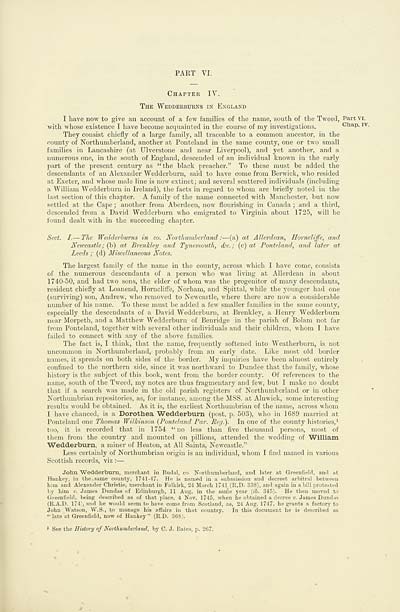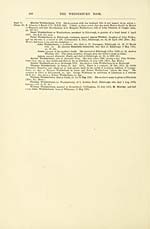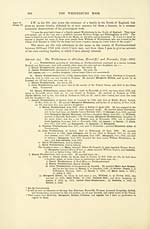Wedderburn book > History
(655) Page 499
Download files
Complete book:
Individual page:
Thumbnail gallery: Grid view | List view

PAKT VI.
Chapter IV.
The Wedderburns in England
I have now to give an account of a few families of the name, south of the Tweed, Part VI.
with whose existence I have become acquainted in the course of my investigations. Chap. iv.
They consist chiefly of a large family, all traceable to a common ancestor, in the
county of Northumberland, another at Ponteland in the same county, one or two small
families in Lancashire (at Ulverstone and near Liverpool), and yet another, and a
numerous one, in the south of England, descended of an individual known in the early
part of the present century as "the black preacher." To these must be added the
descendants of an Alexander Wedderburn, said to have come from Berwick, who resided
at Exeter, and whose male line is now extinct; and several scattered individuals (including
a William AVedderburn in Ireland), the facts in regard to whom are briefly noted in the
last section of this chapter. A family of the name connected with Manchester, but now
settled at the Cape ; another from Aberdeen, now flourishing in Canada ; and a third,
descended from a David Wedderburn who emigrated to Virginia about 1725, will be
found dealt with in the succeeding chapter.
Sect. I. — The Wedderburns in co. Northumberland: — (a) at Allerdean, Homcliffe, and
Newcastle; (b) at Brenkley and Tynemouth, &c; (c) at Ponteland, and later at
Leeds ; (d) Miscellaneous Notes.
The largest family of the name in the county, across which I have come, consists
of the numerous descendants of a person who was living at Allerdean in about
1740-50, and had two sons, the elder of whom was the progenitor of many descendants,
resident chiefly at Loanend, Horncliffe, Norham, and Spittal, while the younger had one
(surviving) son, Andrew, who removed to Newcastle, where there are now a considerable
number of his name. To these must be added a few smaller families in the same county,
especially the descendants of a David Wedderburn, at Brenkley, a Henry Wedderburn
near Morpeth, and a Matthew Wedderburn of Benridge in the parish of Bolam not far
from Ponteland, together with several other individuals and their children, whom I have
failed to connect with any of the above families.
The fact is, I think, that the name, frequently softened into Weatherburn, is not
uncommon in Northumberland, probably from an early date. Like most old border
names, it spreads on both sides of the border. My inquiries have been almost entirely
confined to the northern side, since it was northward to Dundee that the family, whose
history is the subject of this. book, went from the border county. Of references to the
name, south of the Tweed, my notes are thus fragmentary and few, but I make no doubt
that if a search was made in the old parish registers of Northumberland or in other
Northumbrian repositories, as, for instance, among the MSS. at Alnwick, some interesting-
results would be obtained. As it is, the earliest Northumbrian of the name, across whom
I have chanced, is a Dorothea Wedderburn (post, p. 503), who in 1689 married at
Ponteland one Thomas Wilkinson {Ponteland Par. Reg.). In one of the county histories, 1
too, it is recorded that in 1754 "no less than five thousand persons, most of
them from the country and mounted on pillions, attended the wedding of William
Wedderburn, a miner of Heaton, at All Saints, Newcastle."
Less certainly of Northumbrian origin is an individual, whom I find named in various
Scottish records, viz : —
John Wedderburn, merchant in Budal, co. Northumberland, and later at Greenfield, and at
Haukey, in the same county, 1741-47. He is named in a submission and decreet arbitral between
him and Alexander Christie, merchant iu Falkirk, 24 March 1741 (R.D. 338), and again in a bill protested
by him v. James Dundas of Edinburgh, 11 Aug. in the same year (ib. 345). He then moved to
Greenfield, being described as of that place, 4 Nov. 1745, when he obtained a decree v. James Dundas
(R.A.D. 174), and he would seem to have come from Scotland, as, 24 Aug. 1747, he grants a factory to
John Watson, W.S., to manage his affairs in that country. In this document he is described as
"late at Greenfield, now of Hankey" (R.D. 368).
1 See the History of Northumberland, by C. J. Bates, p. 267.
Chapter IV.
The Wedderburns in England
I have now to give an account of a few families of the name, south of the Tweed, Part VI.
with whose existence I have become acquainted in the course of my investigations. Chap. iv.
They consist chiefly of a large family, all traceable to a common ancestor, in the
county of Northumberland, another at Ponteland in the same county, one or two small
families in Lancashire (at Ulverstone and near Liverpool), and yet another, and a
numerous one, in the south of England, descended of an individual known in the early
part of the present century as "the black preacher." To these must be added the
descendants of an Alexander Wedderburn, said to have come from Berwick, who resided
at Exeter, and whose male line is now extinct; and several scattered individuals (including
a William AVedderburn in Ireland), the facts in regard to whom are briefly noted in the
last section of this chapter. A family of the name connected with Manchester, but now
settled at the Cape ; another from Aberdeen, now flourishing in Canada ; and a third,
descended from a David Wedderburn who emigrated to Virginia about 1725, will be
found dealt with in the succeeding chapter.
Sect. I. — The Wedderburns in co. Northumberland: — (a) at Allerdean, Homcliffe, and
Newcastle; (b) at Brenkley and Tynemouth, &c; (c) at Ponteland, and later at
Leeds ; (d) Miscellaneous Notes.
The largest family of the name in the county, across which I have come, consists
of the numerous descendants of a person who was living at Allerdean in about
1740-50, and had two sons, the elder of whom was the progenitor of many descendants,
resident chiefly at Loanend, Horncliffe, Norham, and Spittal, while the younger had one
(surviving) son, Andrew, who removed to Newcastle, where there are now a considerable
number of his name. To these must be added a few smaller families in the same county,
especially the descendants of a David Wedderburn, at Brenkley, a Henry Wedderburn
near Morpeth, and a Matthew Wedderburn of Benridge in the parish of Bolam not far
from Ponteland, together with several other individuals and their children, whom I have
failed to connect with any of the above families.
The fact is, I think, that the name, frequently softened into Weatherburn, is not
uncommon in Northumberland, probably from an early date. Like most old border
names, it spreads on both sides of the border. My inquiries have been almost entirely
confined to the northern side, since it was northward to Dundee that the family, whose
history is the subject of this. book, went from the border county. Of references to the
name, south of the Tweed, my notes are thus fragmentary and few, but I make no doubt
that if a search was made in the old parish registers of Northumberland or in other
Northumbrian repositories, as, for instance, among the MSS. at Alnwick, some interesting-
results would be obtained. As it is, the earliest Northumbrian of the name, across whom
I have chanced, is a Dorothea Wedderburn (post, p. 503), who in 1689 married at
Ponteland one Thomas Wilkinson {Ponteland Par. Reg.). In one of the county histories, 1
too, it is recorded that in 1754 "no less than five thousand persons, most of
them from the country and mounted on pillions, attended the wedding of William
Wedderburn, a miner of Heaton, at All Saints, Newcastle."
Less certainly of Northumbrian origin is an individual, whom I find named in various
Scottish records, viz : —
John Wedderburn, merchant in Budal, co. Northumberland, and later at Greenfield, and at
Haukey, in the same county, 1741-47. He is named in a submission and decreet arbitral between
him and Alexander Christie, merchant iu Falkirk, 24 March 1741 (R.D. 338), and again in a bill protested
by him v. James Dundas of Edinburgh, 11 Aug. in the same year (ib. 345). He then moved to
Greenfield, being described as of that place, 4 Nov. 1745, when he obtained a decree v. James Dundas
(R.A.D. 174), and he would seem to have come from Scotland, as, 24 Aug. 1747, he grants a factory to
John Watson, W.S., to manage his affairs in that country. In this document he is described as
"late at Greenfield, now of Hankey" (R.D. 368).
1 See the History of Northumberland, by C. J. Bates, p. 267.
Set display mode to:
![]() Universal Viewer |
Universal Viewer | ![]() Mirador |
Large image | Transcription
Mirador |
Large image | Transcription
Images and transcriptions on this page, including medium image downloads, may be used under the Creative Commons Attribution 4.0 International Licence unless otherwise stated. ![]()
| Histories of Scottish families > Wedderburn book > History > (655) Page 499 |
|---|
| Permanent URL | https://digital.nls.uk/95658579 |
|---|
| Attribution and copyright: |
|
|---|---|
| Description | A selection of almost 400 printed items relating to the history of Scottish families, mostly dating from the 19th and early 20th centuries. Includes memoirs, genealogies and clan histories, with a few produced by emigrant families. The earliest family history goes back to AD 916. |
|---|

